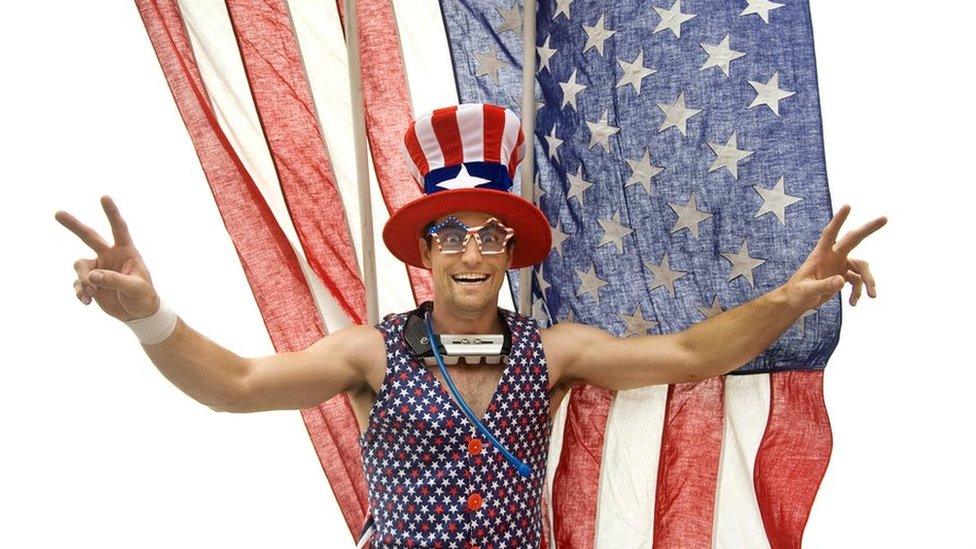Donald Trump orders creation of 'national heroes' garden
- Published
President Trump held a rally at Mount Rushmore on Friday
US President Donald Trump has ordered the creation of a "National Garden of American Heroes" to defend what he calls "our great national story" against those who vandalise statues.
His executive order, external gives a new task force 60 days to present plans, including a location, for the garden.
He insists the new statues must be lifelike, "not abstract or modernist".
A number of US statues have been pulled down since the police killing of an unarmed black man, George Floyd in May.
Monuments linked to the slave-owning Confederacy during the Civil War in America have been especially targeted in the nationwide protests ignited by the death of Floyd in Minneapolis, Minnesota, after a white police officer knelt on his neck for nearly nine minutes.
President Trump has defended Confederate symbols as a part of American heritage.
In a speech to mark Independence Day at Mount Rushmore, he condemned the anti-racism protesters who toppled statues.
He said America's national heritage was being threatened - an emotive appeal for patriotism.
The garden - to be in a place of natural beauty near a city - is to be opened by 4 July 2026, Mr Trump's executive order says. State authorities and civic organisations are invited to donate statues for it.
President Trump's choice of historical figures to be commemorated in the garden is likely to be controversial.
The list of "historically significant" Americans includes Founding Fathers like George Washington and Thomas Jefferson, but also frontiersman Davy Crockett, evangelical Christian preacher Billy Graham, Ronald Reagan and World War Two heroes Douglas MacArthur and George Patton.
There will also be statues of African-American abolitionist Harriet Tubman and civil rights campaigner Martin Luther King Jr.
Mr Trump also includes non-Americans who "made substantive historical contributions to the discovery, development, or independence of the future United States".
So the garden can have statues of Christopher Columbus, Junipero Serra and the Marquis de Lafayette.
Columbus and the Spanish Catholic missionary Serra are far from heroic for Native Americans, because their "discoveries" led to the enslavement and exploitation of indigenous people by white colonists.
There are no Native American or Hispanic individuals on the list, which also includes Republican presidents but no Democrats.
Historians interviewed by the Washington Post criticised the idea, with James Grossman, executive director of the American Historical Association, saying the choices "vary from odd to probably inappropriate to provocative".

Symbolic response to protesters


Donald Trump's proposed garden offers insight into who the president considers worthy of celebration. There are America's founders, joined by 19th-Century frontiersmen glorified in old Disney television dramas, World War Two generals and slavery abolitionists.
Republican Party icon Ronald Reagan is the only president from the past 150 years, and Antonin Scalia, whose primary legal legacy is penning scathing conservative dissents to majority opinions, is the only Supreme Court justice. It's the kind of list that could largely be gleaned from grade-school history books of the 1950s, an era that suffuses the president's politics of nostalgia for "American greatness".
In his Mount Rushmore speech, the president lashed out at those he accused of wanting to destroy the nation's cultural heritage. The garden is his symbolic response. At a time when the president is defending statues that honour Civil War rebels who fought US soldiers, Mr Trump is making an affirmative case for those who he believes embody the US values of patriotism, inspiration and courage. While many Americans are now reviewing US history with a critical eye, the garden would be a glossy tribute to the president's view of American "exceptionalism".
It will surely antagonise the president's critics, who see him as a divisive and ill-suited arbiter of American values. It also portends an autumn presidential campaign of pitched cultural warfare.

What else did President Trump say in his speech?
It was a highly symbolic setting for the speech: Mount Rushmore, in South Dakota, features the carved faces of four US presidents, two of whom - George Washington and Thomas Jefferson - were slave-owners.
It also stands on land that was taken from the indigenous Lakota Sioux by the US government in the 1800s.
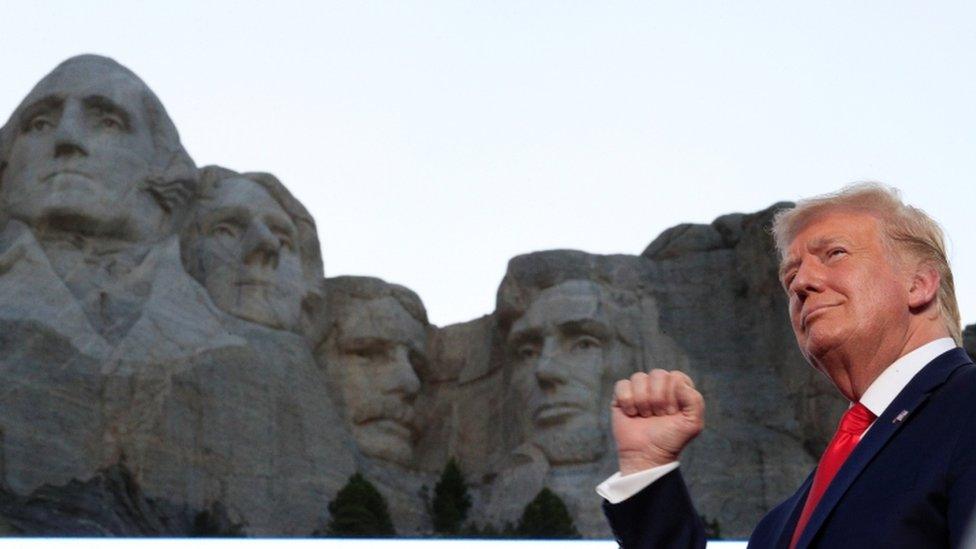
President Trump vowed to protect monuments against what he called a "left-wing cultural revolution"
President Trump railed against the "cancel culture" of those who toppled monuments during recent anti-racism protests.
He condemned those who targeted statues as "angry mobs".
Mr Trump accused protesters of "a merciless campaign to wipe out our history, defame our heroes, erase our values, and indoctrinate our children". "We will not be silenced," he said.
The president, who has been heavily criticised for his handling of the US coronavirus pandemic, made little reference to the disease that has now claimed almost 130,000 American lives.
Black Americans were still enslaved for 89 years after American "Independence Day"
The US recorded its largest single-day rise in coronavirus infections on Friday, bringing the total to more than 2.5 million - the most of any country.
Masks and social distancing were not mandatory at the Mount Rushmore event, despite warnings by health officials.
Native American groups criticised Mr Trump's visit for posing a health risk, and for celebrating US independence in an area that is sacred to them.
Many Native Americans do not celebrate Independence Day because they associate it with the colonisation of their tribal homelands and the loss of their cultural freedoms.

More on George Floyd's death
VIEWPOINT: Tipping point for racially divided nation
TIMELINE: Recent black deaths at hands of police
CRIME AND JUSTICE: How are African Americans treated?
Four numbers that explain impact of George Floyd
- Published4 July 2020
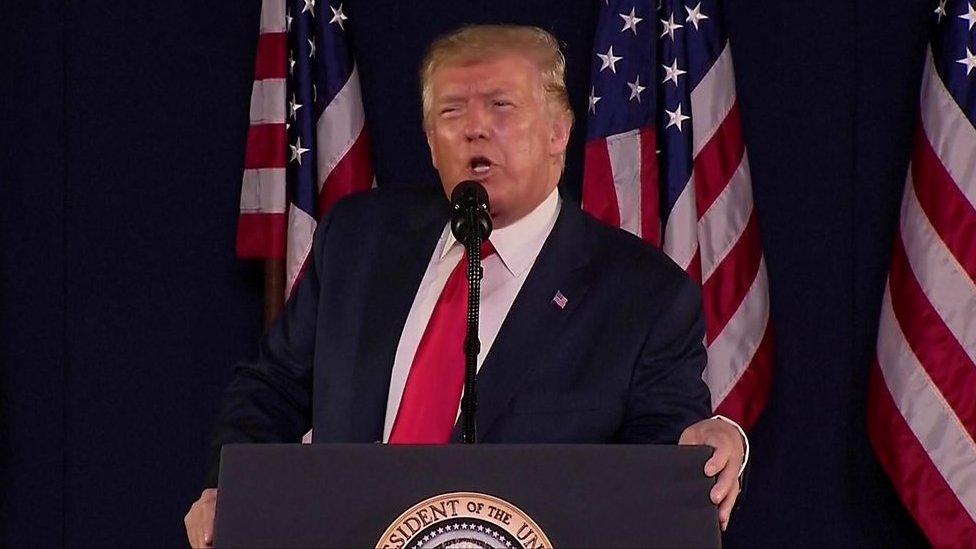
- Published25 June 2020
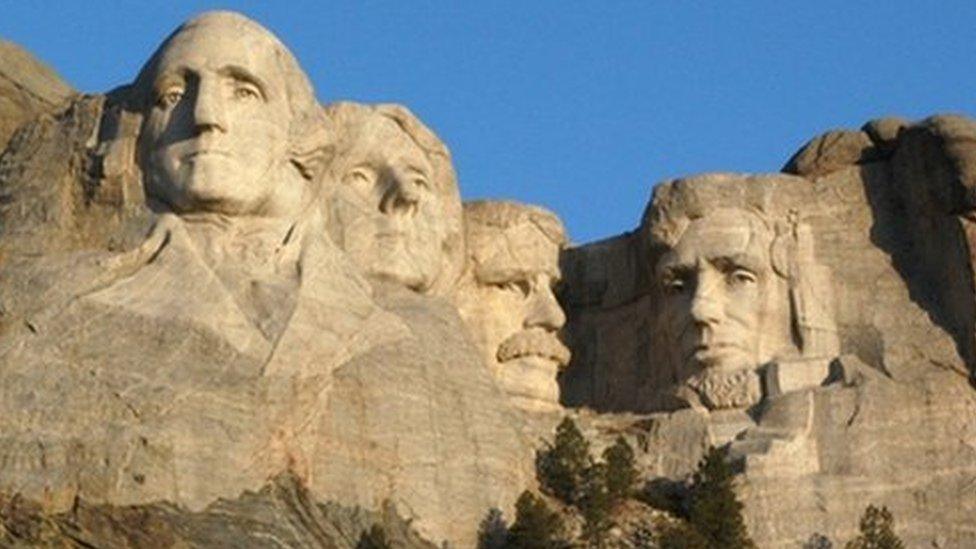
- Published27 June 2020
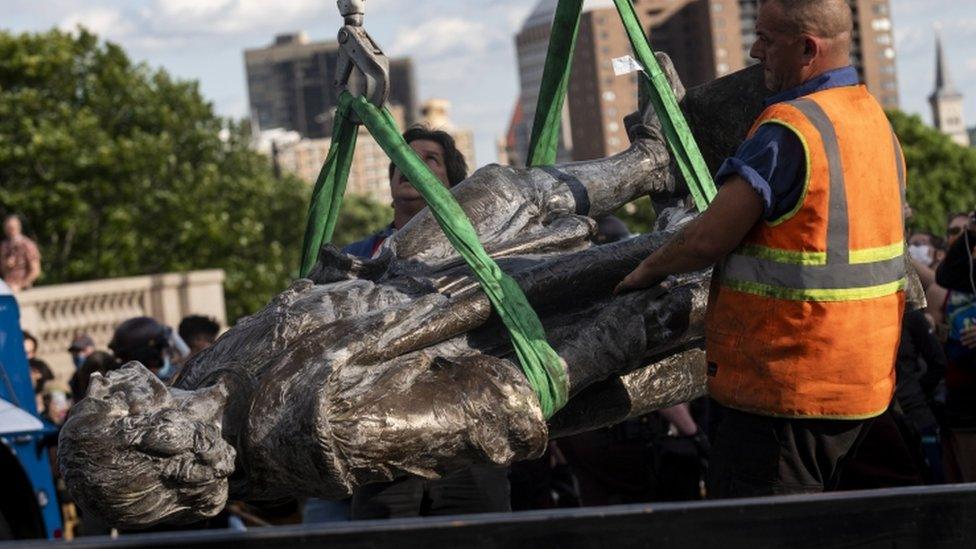
- Published2 July 2020
